【BBC六分钟英语】你害怕复制人类智能行为的机器吗?
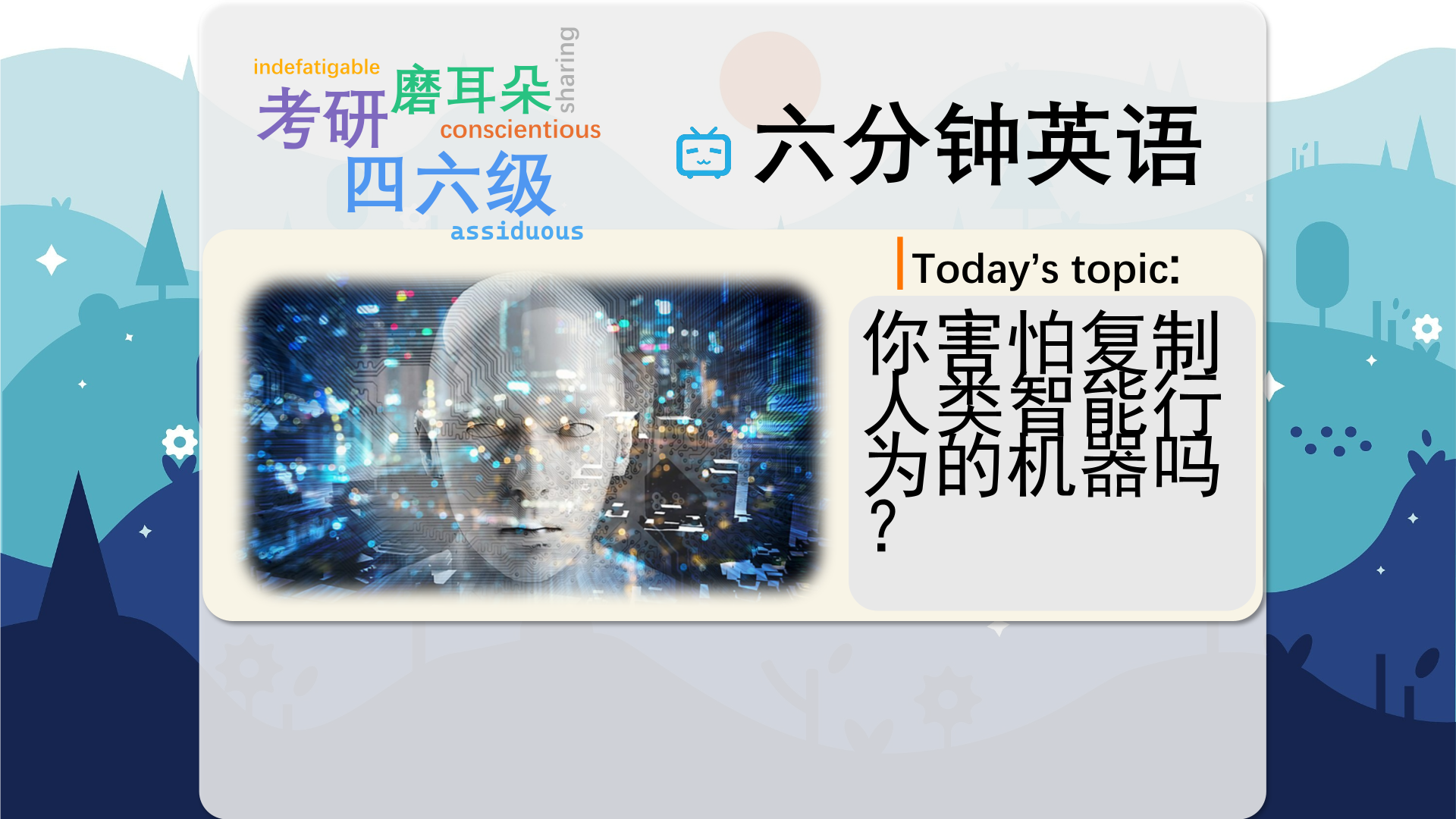
【英文脚本】
Neil
Welcome to 6 Minute English, where we bring you an intelligent topic and six related items of vocabulary. I’m Neil.
Tim
And I’m Tim. And today we’re talking about AI, or Artificial Intelligence.
Neil
Artificial Intelligence is the ability of machines to copy human intelligent behaviour, for example, an intelligent machine can learn from its own mistakes, and make decisions based on what’s happened in the past.
Tim
There’s a lot of talk about AI these days, Neil, but it’s still just science fiction, isn’t it?
Neil
That’s not true, AI is everywhere. Machine thinking is in our homes, offices, schools and hospitals. Computer algorithms are helping us drive our cars. They’re diagnosing what’s wrong with us in hospitals. They’re marking student essays… They’re telling us what to read on our smartphones…
Tim
Well, that really does sound like science fiction, but it’s happening already, you say, Neil?
Neil
It’s definitely happening, Tim. And an algorithm, by the way, is a set of steps a computer follows in order to solve a problem. So can you tell me what was the name of the computer which famously beat world chess champion Garry Kasparov using algorithms in 1997? Was it… a) Hal, b) Alpha 60 or c) Deep Blue?
Tim
I’ll say Deep Blue. Although I’m just guessing.
Neil
Was it an educated guess, Tim?
Tim
I know a bit about chess…
Neil
An educated guess is based on knowledge and experience and is therefore likely to be correct. Well, we’ll find out later on how educated your guess was in this case, Tim!
Tim
Indeed. But getting back to AI and what machines can do, are they any good at solving real-life problems? Computers think in zeros and ones don’t they? That sounds like a pretty limited language when it comes to life experience!
Neil
You would be surprised to what those zeroes and ones can do, Tim. Although you’re right that AI does have its limitations at the moment. And if something has limitations there’s a limit on what it can do or how good it can be.
Tim
OK, well now might be a good time to listen to Zoubin Bharhramani, Professor of Information Engineering at the University of Cambridge and deputy director of the Leverhulme Centre for the Future of Intelligence. He’s talking about what limitations AI has at the moment.
Zoubin Bharhramani, Professor of Information Engineering at the University of Cambridge and deputy director of the Leverhulme Centre for the Future of Intelligence
I think it’s very interesting how many of the things that we take for granted, we humans take for granted, as being sort of things we don’t even think about like how do we walk, how do we reach, how do we recognise our mother. You know, all these things. When you start to think how to implement them on a computer, you realise that it’s those things that are incredibly difficult to get computers to do, and that’s where the current cutting edge of research is.
Neil
If we take something for granted we don’t realise how important something is.
Tim
You sometimes take me for granted, I think, Neil.
Neil
No, I never take you for granted, Tim! You’re far too important for that!
Tim
Good to hear! So things we take for granted are doing every day tasks like walking, picking something up, or recognizing somebody. We implement, or perform, these things without thinking, Whereas it’s cutting edge research to try and program a machine to do them.
Neil
Cutting edge means very new and advanced. It’s interesting isn’t it, that over ten years ago a computer beat a chess grand master, but the same computer would find it incredibly difficult to pick up a chess piece.
Tim
I know. It’s very strange. But now you’ve reminded me that we need the answer to today’s question.
Neil
Which was: What was the name of the computer which famously beat world chess champion Garry Kasparov in 1997? Now, you said Deep Blue, Tim, and … that was the right answer!
Tim
You see, my educated guess was based on knowledge and experience!
Neil
Or maybe you were just lucky. So, the IBM supercomputer Deep Blue played against US world chess champion Garry Kasparov in two chess matches. The first match was played in Philadelphia in 1996 and was won by Kasparov. The second was played in New York City in 1997 and won by Deep Blue. The 1997 match was the first defeat of a reigning world chess champion by a computer under tournament conditions.
Tim
Let’s go through the words we learned today. First up was ‘artificial intelligence’ or AI, the ability of machines to copy human intelligent behaviour.
Neil
“There are AI programs that can write poetry.”
Tim
Do you have any examples you can recite?
Neil
Afraid I don’t! Number two, an algorithm is a set of steps a computer follows in order to solve a problem. For example, “Google changes its search algorithm hundreds of times every year.”
Tim
The adjective is algorithmic, for example, “Google has made many algorithmic changes.”
Neil
Number three, if something has ‘limitations’, there’s a limit on what it can do or how good it can be. “Our show has certain limitations, for example, it’s only six minutes long!”
Tim
That’s right, there’s only time to present six vocabulary items. Short but sweet!
Neil
And very intelligent, too. OK, the next item is ‘take something for granted’, which is when we don’t realize how important something is.
Tim
“We take our smart phones for granted these days, but before 1995 hardly anyone owned one.”
Neil
Number five, ‘to implement’, means to perform a task, or take action.
Tim
“Neil implemented some changes to the show.”
Neil
The final item is ‘cutting edge’, new and advanced, “This software is cutting edge.”
Tim
“The software uses cutting edge technology.”
Neil
OK, that’s all we have time for on today’s cutting edge show. But please check out our Instagram, Twitter, Facebook and YouTube pages.
Tim
Bye-bye!
Neil
Goodbye!
【中英文双语脚本】
Neil(尼尔)
Welcome to 6 Minute English, where we bring you an intelligent topic and six related items of vocabulary. I’m Neil.
欢迎来到六分钟英语,我们为您带来一个智能主题和六个相关词汇项目。我是 Neil。
Tim(提姆)
And I’m Tim. And today we’re talking about AI, or Artificial Intelligence.
我是 Tim。今天我们谈论的是 AI,即人工智能。
Neil(尼尔)
Artificial Intelligence is the ability of machines to copy human intelligent behaviour, for example, an intelligent machine can learn from its own mistakes, and make decisions based on what’s happened in the past.
人工智能是机器复制人类智能行为的能力,例如,智能机器可以从自己的错误中学习,并根据过去发生的事情做出决策。
Tim(提姆)
There’s a lot of talk about AI these days, Neil, but it’s still just science fiction, isn’t it?
Neil,现在有很多关于 AI 的讨论,但它仍然只是科幻小说,不是吗?
Neil(尼尔)
That’s not true, AI is everywhere. Machine thinking is in our homes, offices, schools and hospitals. Computer algorithms are helping us drive our cars. They’re diagnosing what’s wrong with us in hospitals. They’re marking student essays… They’re telling us what to read on our smartphones…
这不是真的,AI 无处不在。机器思维遍布我们的家庭、办公室、学校和医院。计算机算法正在帮助我们驾驶汽车。他们正在诊断我们在医院里出了什么问题。他们在批改学生的论文……他们告诉我们在智能手机上阅读什么……
Tim(提姆)
Well, that really does sound like science fiction, but it’s happening already, you say, Neil?
嗯,这听起来确实像科幻小说,但它已经发生了,你说,尼尔?
Neil(尼尔)
It’s definitely happening, Tim. And an algorithm, by the way, is a set of steps a computer follows in order to solve a problem. So can you tell me what was the name of the computer which famously beat world chess champion Garry Kasparov using algorithms in 1997? Was it… a) Hal, b) Alpha 60 or c) Deep Blue?
这肯定正在发生,蒂姆。顺便说一句,算法是计算机为解决问题而遵循的一组步骤。那么,您能告诉我 1997 年使用算法击败世界国际象棋冠军加里·卡斯帕罗夫 (Garry Kasparov) 的计算机名称是什么吗?是不是……a) Hal,b) Alpha 60 还是 c) Deep Blue?
Tim(提姆)
I’ll say Deep Blue. Although I’m just guessing.
我会说 Deep Blue。虽然我只是猜测。
Neil(尼尔)
Was it an educated guess, Tim?
这是一个有根据的猜测吗,蒂姆?
Tim(提姆)
I know a bit about chess…
我对国际象棋了解一点……
Neil(尼尔)
An educated guess is based on knowledge and experience and is therefore likely to be correct. Well, we’ll find out later on how educated your guess was in this case, Tim!
有根据的猜测基于知识和经验,因此很可能是正确的。好吧,我们稍后会发现在这种情况下你的猜测有多有根据,蒂姆!
Tim(提姆)
Indeed. But getting back to AI and what machines can do, are they any good at solving real-life problems? Computers think in zeros and ones don’t they? That sounds like a pretty limited language when it comes to life experience!
事实上。但是回到 AI 和机器可以做什么,它们擅长解决现实生活中的问题吗?计算机以 0 和 1 为单位思考,不是吗?当涉及到生活体验时,这听起来像是一种相当有限的语言!
Neil(尼尔)
You would be surprised to what those zeroes and ones can do, Tim. Although you’re right that AI does have its limitations at the moment. And if something has limitations there’s a limit on what it can do or how good it can be.
你会对那些 0 和 1 能做什么感到惊讶,蒂姆。尽管你是对的,AI 目前确实有其局限性。如果某样东西有局限性,那么它能做什么或能有多好就是有限的。
Tim(提姆)
OK, well now might be a good time to listen to Zoubin Bharhramani, Professor of Information Engineering at the University of Cambridge and deputy director of the Leverhulme Centre for the Future of Intelligence. He’s talking about what limitations AI has at the moment.
好的,现在可能是听剑桥大学信息工程教授兼 Leverhulme 未来智能中心副主任 Zoubin Bharhramani 演讲的好时机。他谈论的是 AI 目前有哪些局限性。
Zoubin Bharhramani, Professor of Information Engineering at the University of Cambridge and deputy director of the Leverhulme Centre for the Future of Intelligence(ZoubinBharhramani,剑桥大学信息工程教授兼Leverhulme智能未来中心副主任)
I think it’s very interesting how many of the things that we take for granted, we humans take for granted, as being sort of things we don’t even think about like how do we walk, how do we reach, how do we recognise our mother. You know, all these things. When you start to think how to implement them on a computer, you realise that it’s those things that are incredibly difficult to get computers to do, and that’s where the current cutting edge of research is.
我认为非常有趣的是,许多我们认为理所当然的事情,我们人类认为理所当然的事情,是我们甚至不考虑的事情,比如我们如何走路,我们如何到达,我们如何认出我们的母亲。你知道的,所有这些事情。当你开始考虑如何在计算机上实现它们时,你会意识到那些让计算机完成的事情非常困难,这就是当前研究的前沿所在。
Neil(尼尔)
If we take something for granted we don’t realise how important something is.
如果我们把某件事视为理所当然,我们就不会意识到某件事有多重要。
Tim(提姆)
You sometimes take me for granted, I think, Neil.
你有时觉得我是理所当然的,我想,Neil。
Neil(尼尔)
No, I never take you for granted, Tim! You’re far too important for that!
不,我从不认为你是理所当然的,蒂姆!你太重要了!
Tim(提姆)
Good to hear! So things we take for granted are doing every day tasks like walking, picking something up, or recognizing somebody. We implement, or perform, these things without thinking, Whereas it’s cutting edge research to try and program a machine to do them.
很高兴听到!因此,我们认为理所当然的事情是每天做一些事情,比如走路、捡东西或认出某人。我们不假思索地实现或执行这些事情,而尝试对机器进行编程来完成它们是尖端研究。
Neil(尼尔)
Cutting edge means very new and advanced. It’s interesting isn’t it, that over ten years ago a computer beat a chess grand master, but the same computer would find it incredibly difficult to pick up a chess piece.
尖端意味着非常新颖和先进。有趣的是,十多年前一台计算机击败了一位国际象棋大师,但同一台计算机会发现要拿起棋子非常困难。
Tim(提姆)
I know. It’s very strange. But now you’ve reminded me that we need the answer to today’s question.
我知道。这很奇怪。但现在你提醒我,我们需要今天问题的答案。
Neil(尼尔)
Which was: What was the name of the computer which famously beat world chess champion Garry Kasparov in 1997? Now, you said Deep Blue, Tim, and … that was the right answer!
那是:1997 年击败国际象棋世界冠军加里·卡斯帕罗夫 (Garry Kasparov) 的计算机叫什么名字?现在,你说了 Deep Blue、Tim 和……这就是正确的答案!
Tim(提姆)
You see, my educated guess was based on knowledge and experience!
你看,我有根据的猜测是基于知识和经验的!
Neil(尼尔)
Or maybe you were just lucky. So, the IBM supercomputer Deep Blue played against US world chess champion Garry Kasparov in two chess matches. The first match was played in Philadelphia in 1996 and was won by Kasparov. The second was played in New York City in 1997 and won by Deep Blue. The 1997 match was the first defeat of a reigning world chess champion by a computer under tournament conditions.
或者,也许你只是很幸运。因此,IBM 超级计算机 Deep Blue 与美国世界国际象棋冠军 Garry Kasparov 进行了两场国际象棋比赛。第一场比赛于 1996 年在费城举行,卡斯帕罗夫获胜。第二场于 1997 年在纽约市举行,由 Deep Blue 获胜。1997 年的比赛是卫冕世界象棋冠军在比赛条件下首次被计算机击败。
Tim(提姆)
Let’s go through the words we learned today. First up was ‘artificial intelligence’ or AI, the ability of machines to copy human intelligent behaviour.
让我们回顾一下我们今天学到的单词。首先是“人工智能”或 AI,即机器复制人类智能行为的能力。
Neil(尼尔)
“There are AI programs that can write poetry.”
“有可以写诗的 AI 程序。”
Tim(提姆)
Do you have any examples you can recite?
你有什么可以背诵的例子吗?
Neil(尼尔)
Afraid I don’t! Number two, an algorithm is a set of steps a computer follows in order to solve a problem. For example, “Google changes its search algorithm hundreds of times every year.”
恐怕我没有!第二,算法是计算机为解决问题而遵循的一组步骤。例如,“Google 每年都会更改其搜索算法数百次”。
Tim(提姆)
The adjective is algorithmic, for example, “Google has made many algorithmic changes.”
形容词是 algorithmic,例如,“Google 已经进行了许多算法更改”。
Neil(尼尔)
Number three, if something has ‘limitations’, there’s a limit on what it can do or how good it can be. “Our show has certain limitations, for example, it’s only six minutes long!”
第三,如果某样东西有 “限制”,那么它能做什么或能有多好就是有限的。“我们的节目有一定的限制,例如,它只有六分钟!”
Tim(提姆)
That’s right, there’s only time to present six vocabulary items. Short but sweet!
没错,只有时间介绍六个词汇项目。简短但甜美!
Neil(尼尔)
And very intelligent, too. OK, the next item is ‘take something for granted’, which is when we don’t realize how important something is.
而且也非常聪明。好的,下一项是“把某事视为理所当然”,这是指我们没有意识到某事有多重要的时候。
Tim(提姆)
“We take our smart phones for granted these days, but before 1995 hardly anyone owned one.”
“如今,我们认为智能手机是理所当然的,但在 1995 年之前,几乎没有人拥有智能手机。”
Neil(尼尔)
Number five, ‘to implement’, means to perform a task, or take action.
第五个数字,“实施”,意思是执行任务或采取行动。
Tim(提姆)
“Neil implemented some changes to the show.”
“尼尔对节目进行了一些更改。”
Neil(尼尔)
The final item is ‘cutting edge’, new and advanced, “This software is cutting edge.”
最后一项是“尖端”,新颖而先进,“这个软件是最先进的。
Tim(提姆)
“The software uses cutting edge technology.”
“该软件使用尖端技术。”
Neil(尼尔)
OK, that’s all we have time for on today’s cutting edge show. But please check out our Instagram, Twitter, Facebook and YouTube pages.
好了,这就是我们今天最前沿节目的全部时间。但请查看我们的 Instagram、Twitter、Facebook 和 YouTube 页面。
Tim(提姆)
Bye-bye!
再见!
Neil(尼尔)
Goodbye!
再见!

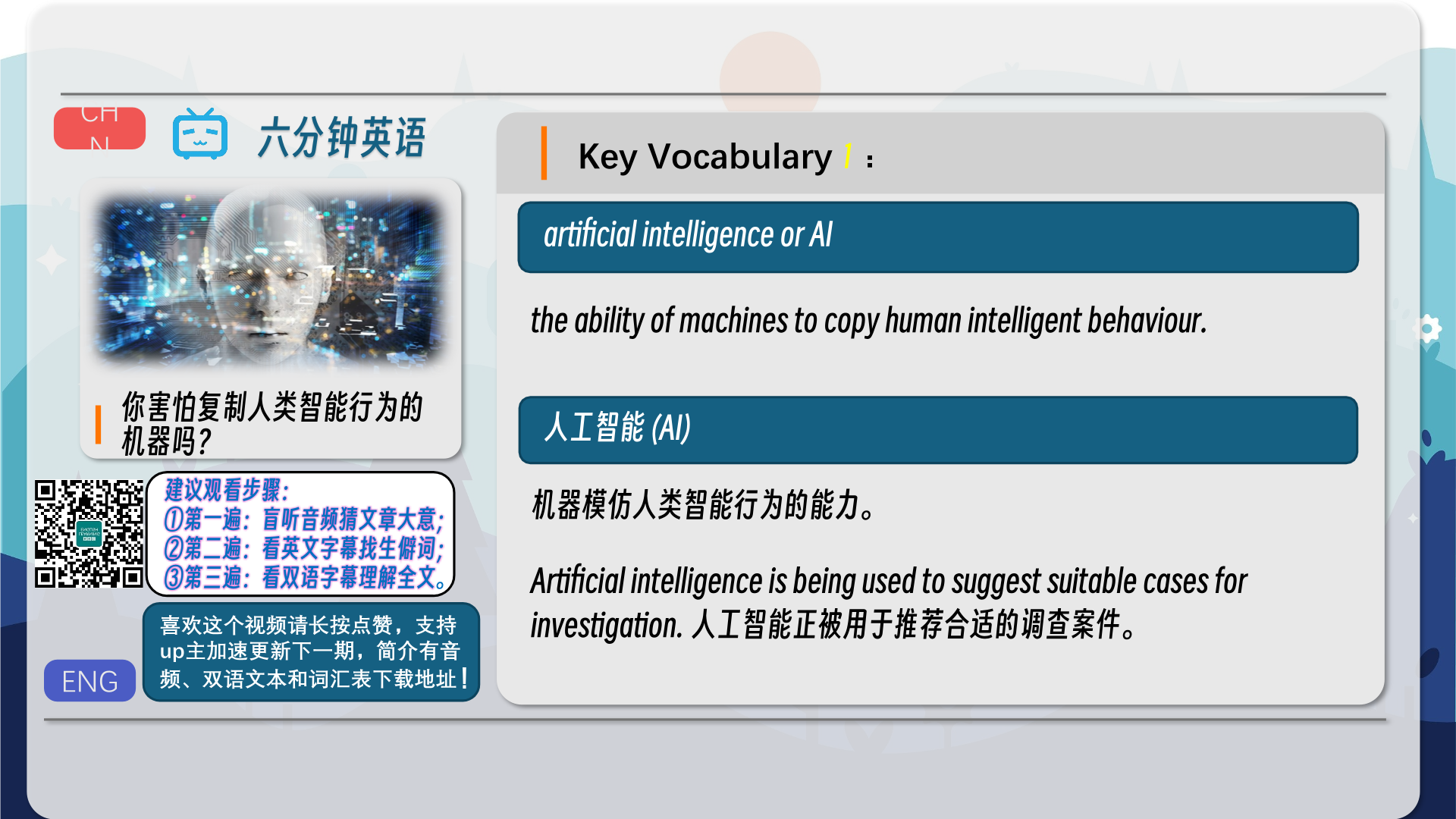
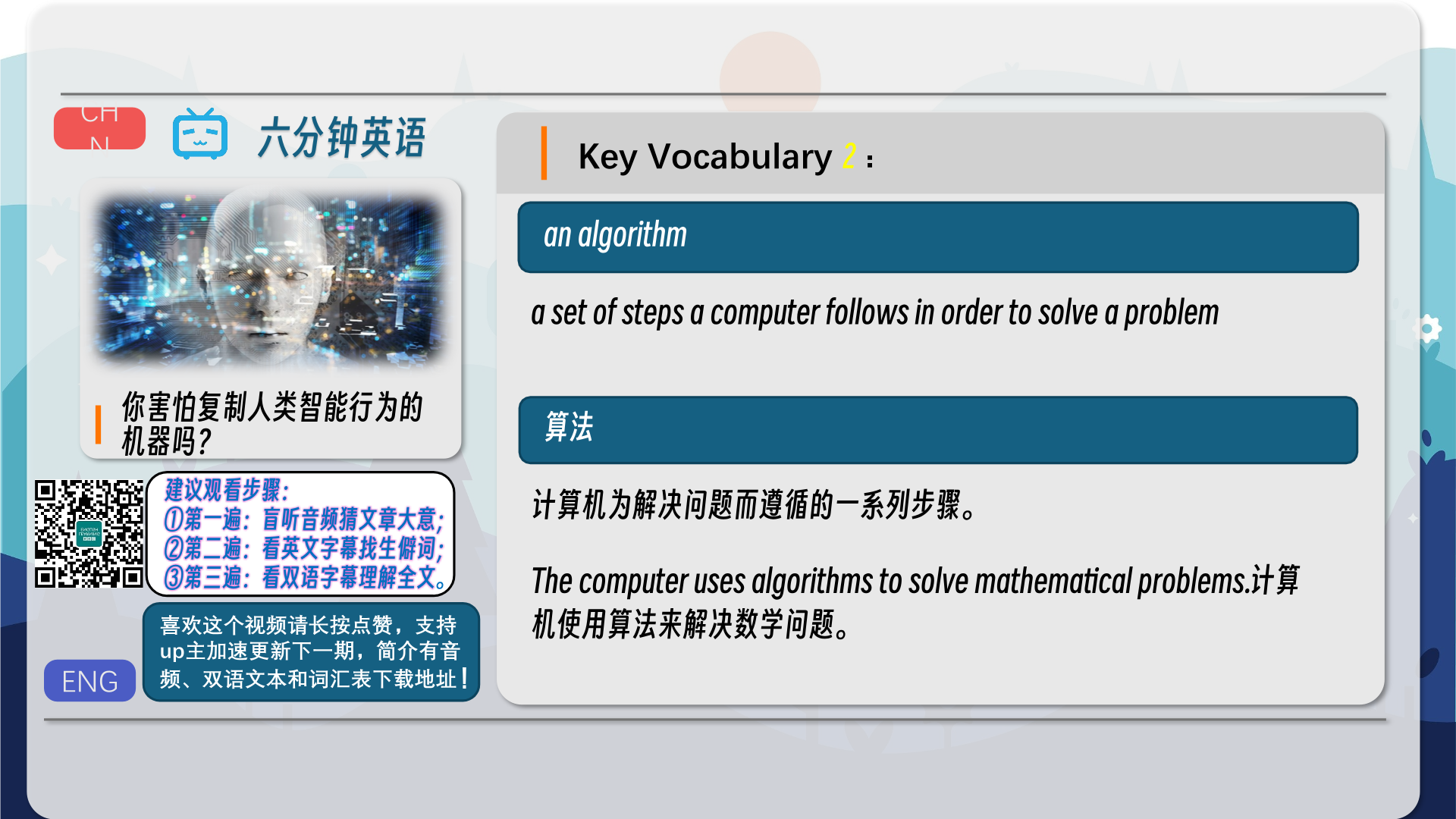
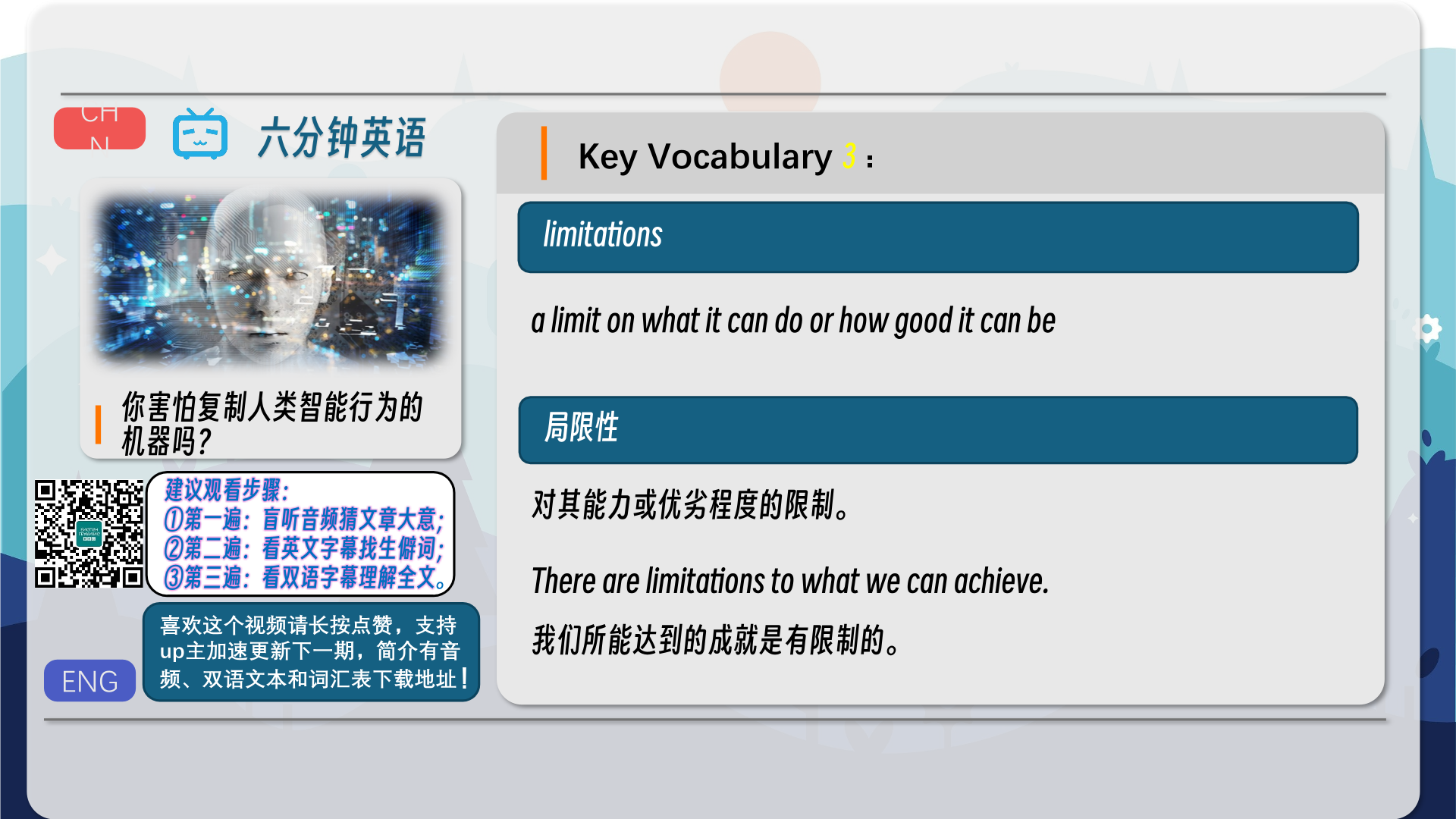
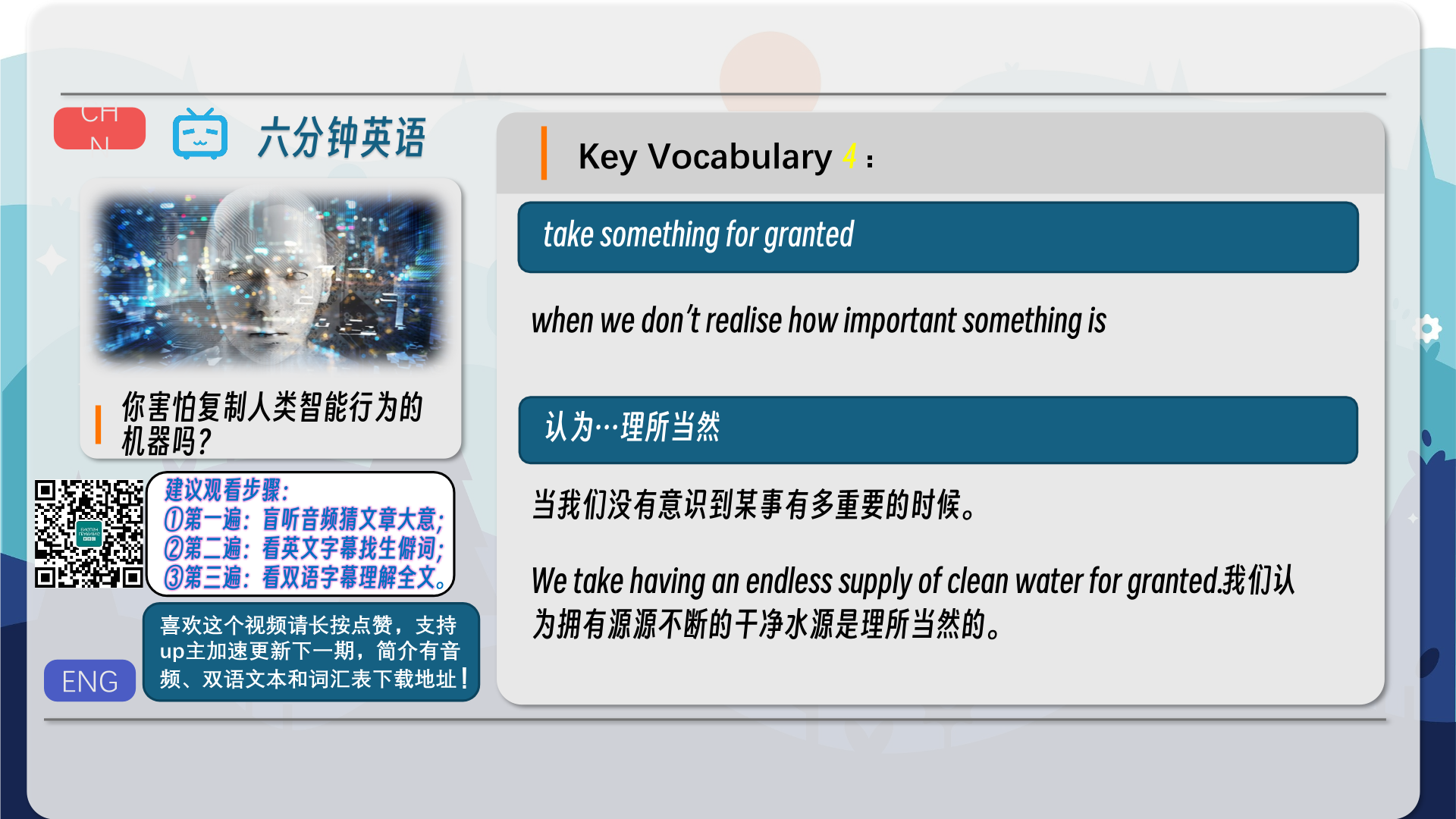
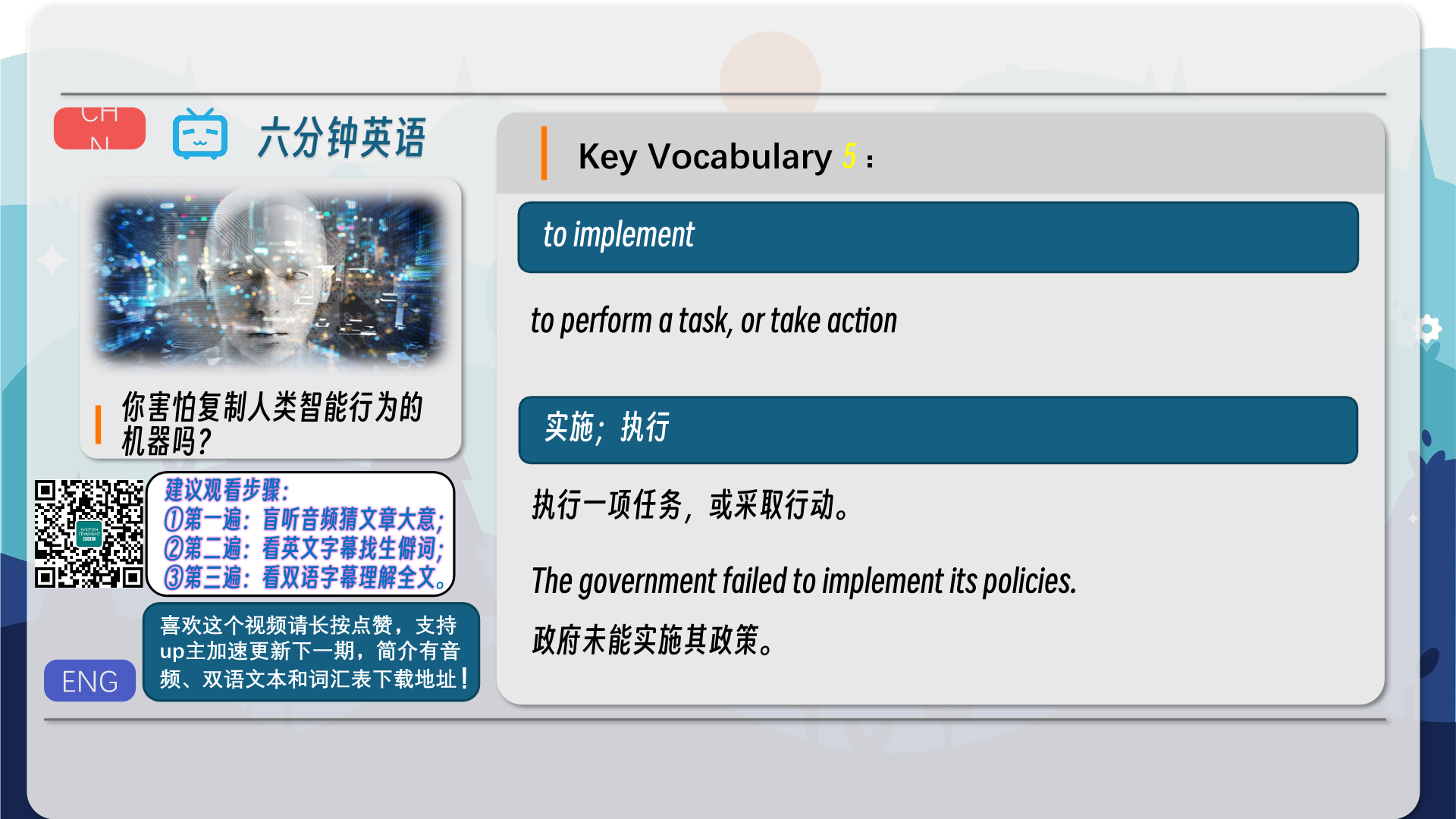
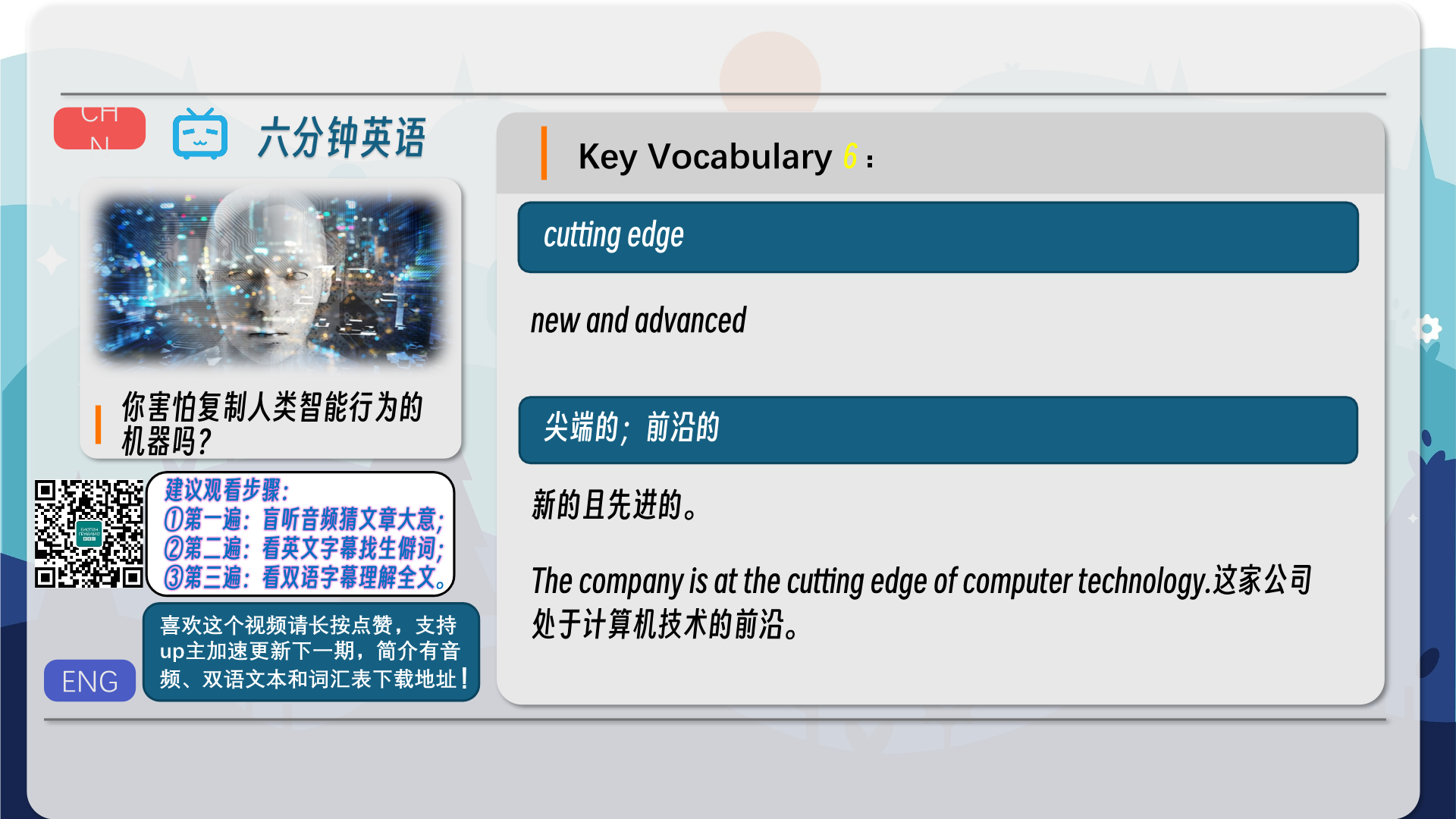
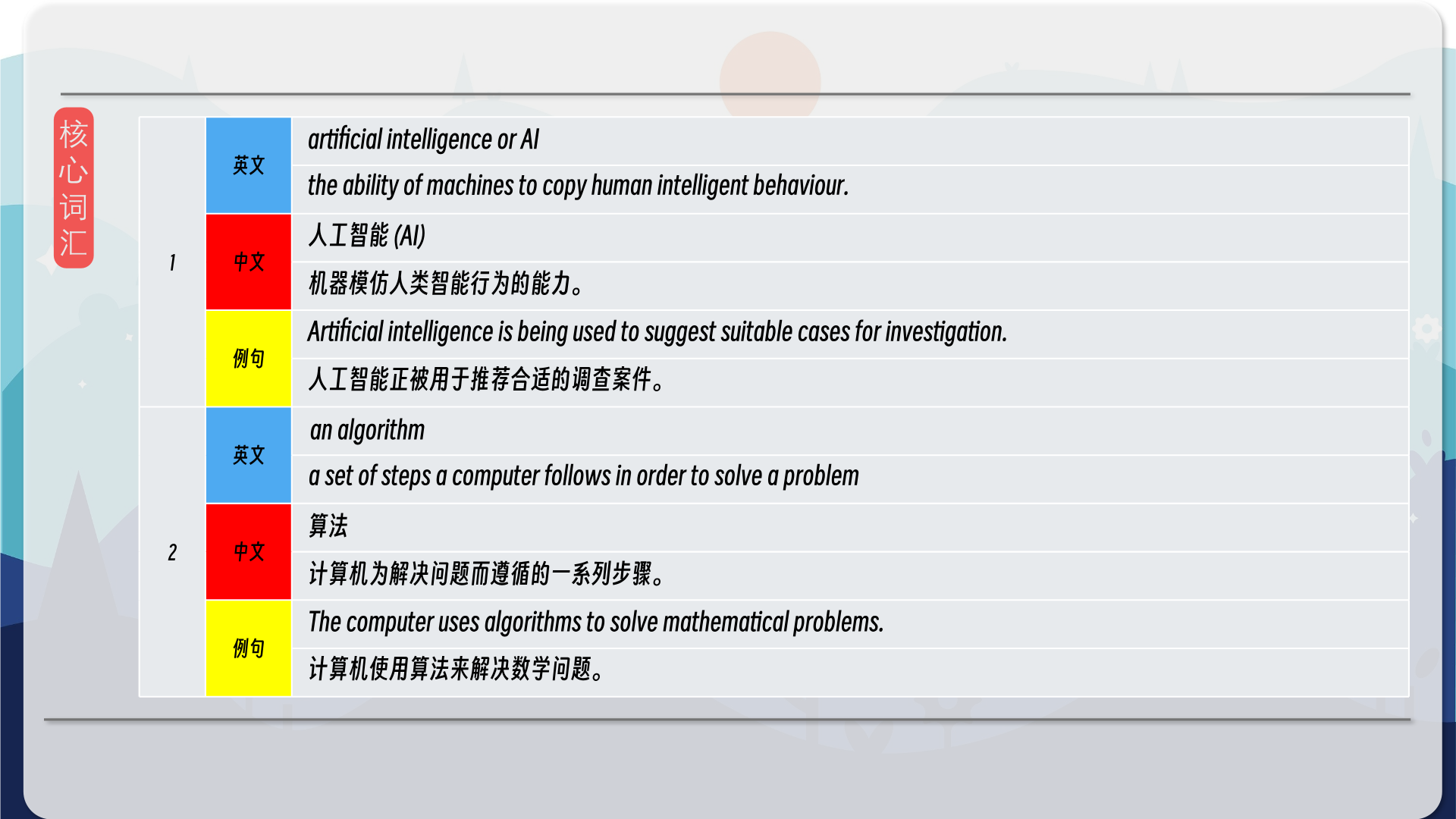
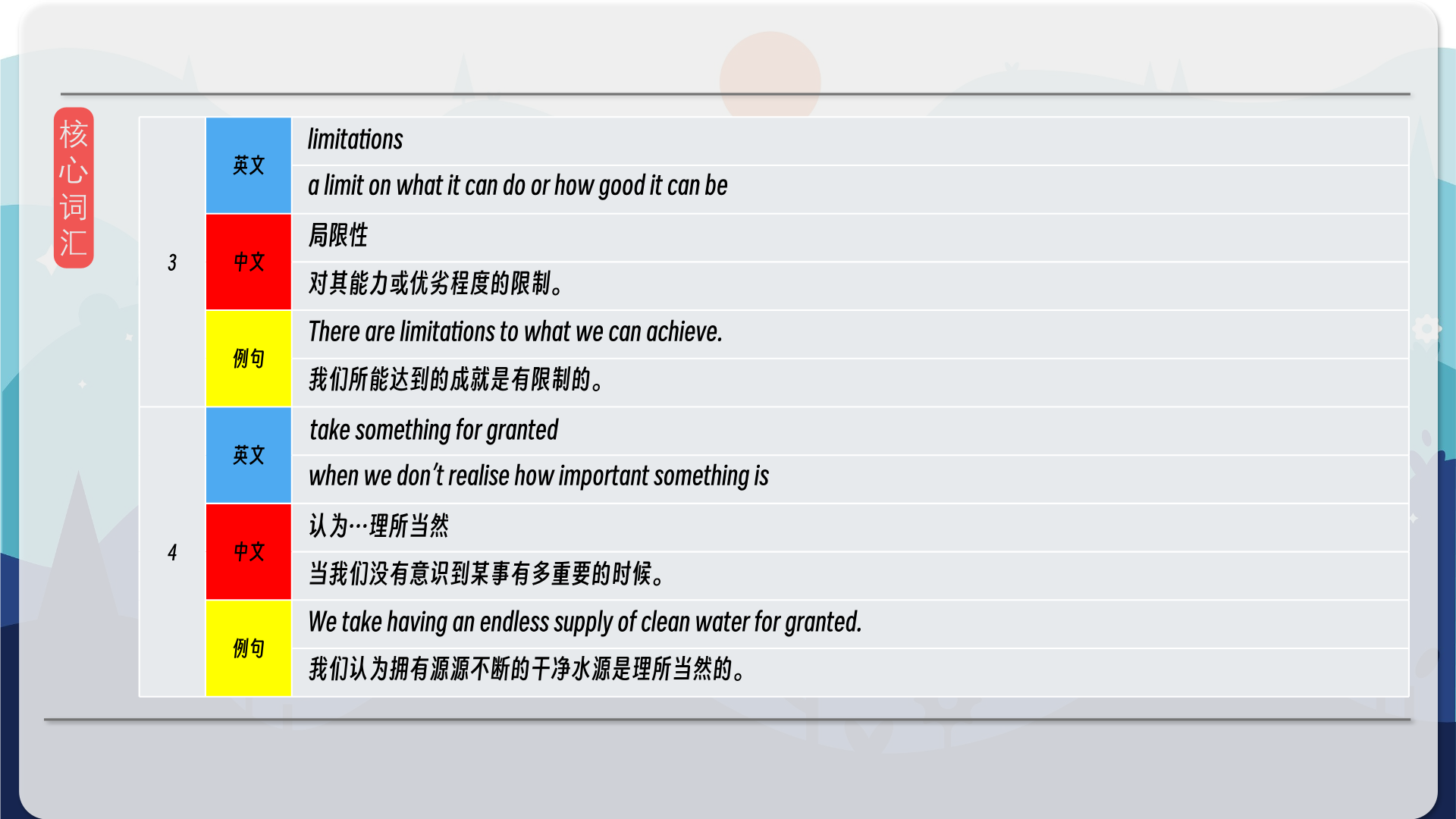
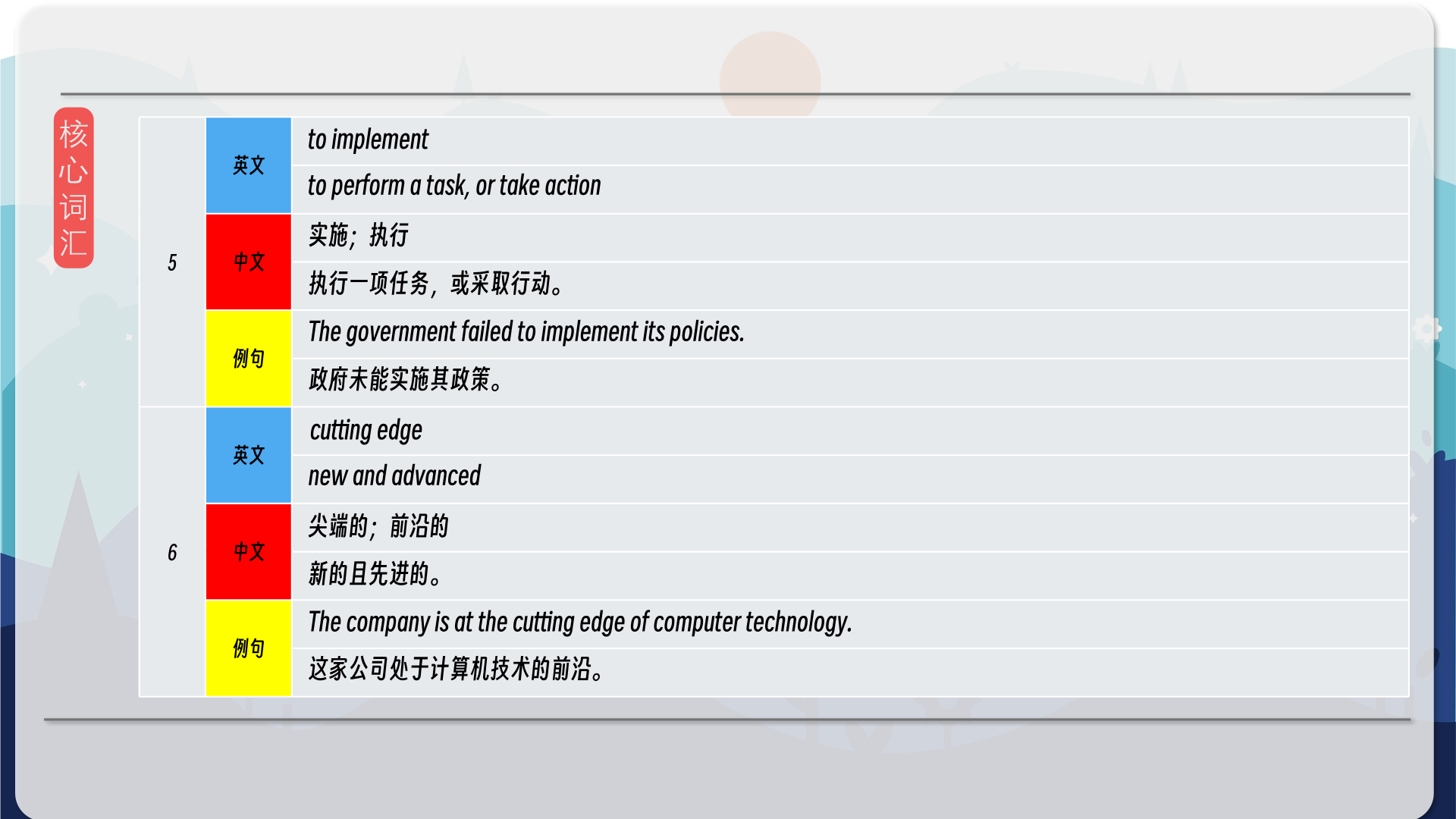
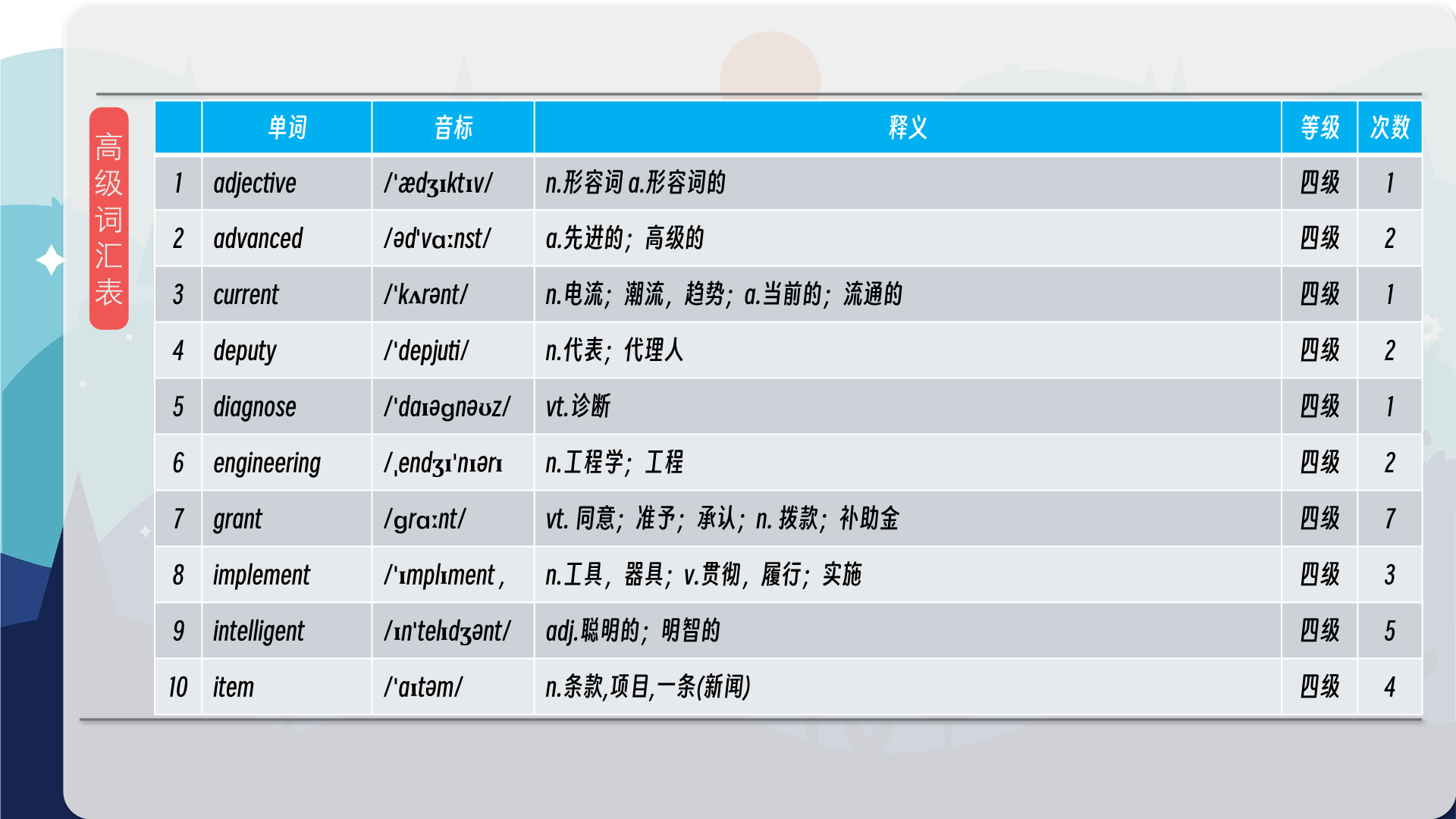
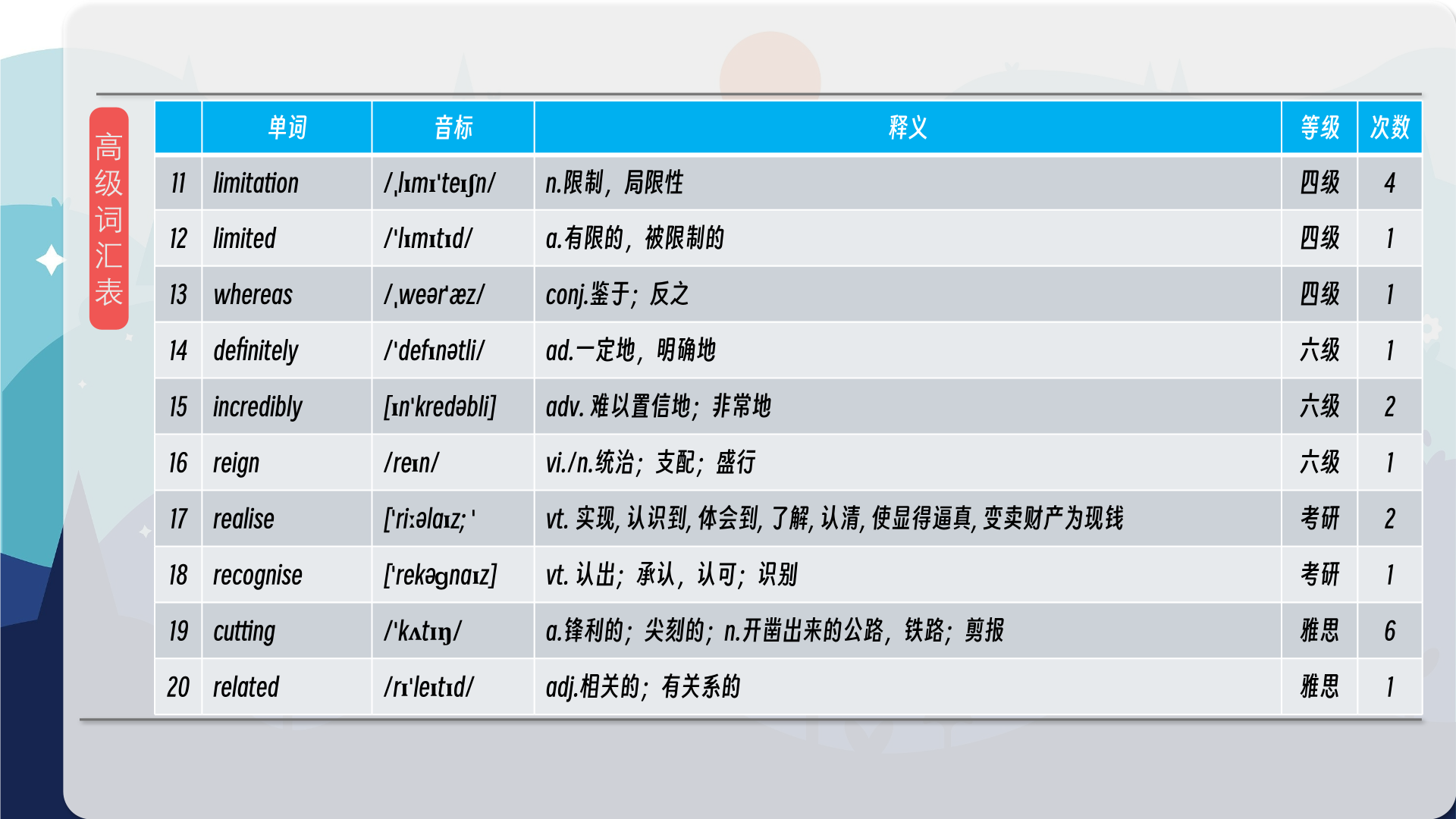

【核心词汇】
artificial intelligence or AI
the ability of machines to copy human intelligent behaviour.
人工智能 (AI)
机器模仿人类智能行为的能力。
Artificial intelligence is being used to suggest suitable cases for investigation.
人工智能正被用于推荐合适的调查案件。
an algorithm
a set of steps a computer follows in order to solve a problem
算法
计算机为解决问题而遵循的一系列步骤。
The computer uses algorithms to solve mathematical problems.
计算机使用算法来解决数学问题。
limitations
a limit on what it can do or how good it can be
局限性
对其能力或优劣程度的限制。
There are limitations to what we can achieve.
我们所能达到的成就是有限制的。
take something for granted
when we don’t realise how important something is
认为…理所当然
当我们没有意识到某事有多重要的时候。
We take having an endless supply of clean water for granted.
我们认为拥有源源不断的干净水源是理所当然的。
to implement
to perform a task, or take action
实施;执行
执行一项任务,或采取行动。
The government failed to implement its policies.
政府未能实施其政策。
cutting edge
new and advanced
尖端的;前沿的
新的且先进的。
The company is at the cutting edge of computer technology.
这家公司处于计算机技术的前沿。
在公众号里输入6位数字,获取【对话音频、英文文本、中文翻译、核心词汇和高级词汇表】电子档,6位数字【暗号】在文章的最后一张图片,如【220728】,表示22年7月28日这一期。公众号没有的文章说明还没有制作相关资料。年度合集在B站【六分钟英语】工房获取,每年共计300+文档,感谢支持!